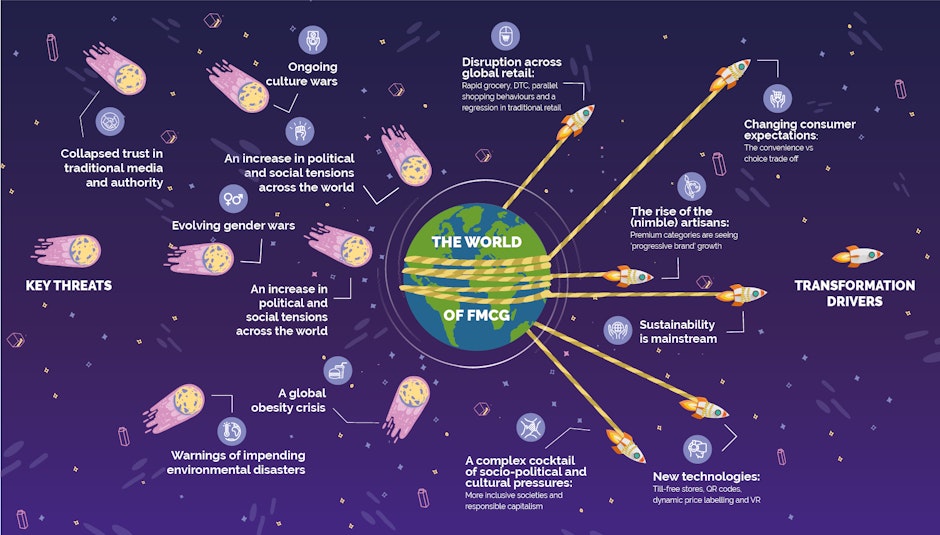New Finn research unearths the 7 forces transforming FMCG
Following a 9 month research program creative communications agency Finn is launching 'The Age of Progressive FMCG’ a major piece of qualitative research undertaken to unpick the key transformation drivers in FMCG

'The Age of Progressive FMCG’ has unearthed 7 drivers of transformation in FMCG which have been summarised below but the full report is available to download here
Transformation drivers
I. The rapid growth in e-commerce, precipitated by the pandemic: *the number of consumers in the UK who do a weekly grocery shop online has doubled during lockdown *
II. Disruption across the global retail sector undergoing dramatic change: the dawn of rapid grocery, DTC, parallel shopping behaviours and collapse of the traditional retail sector
III. The emergence and consumer take-up of new technologies: the arrival of till-free stores, revival of QR codes, dynamic price labelling and virtual reality
IV. The rise of the (nimble) artisans: a significant share of premium categories in the food and drink sector are now owned by ‘progressive’ brands
V. Changing consumer expectations: the convenience vs choice (and speed) trade-off
VI. Sustainability is mainstream: sustainable practice and governance now impacts the bottom line, opens up new stakeholder relationships and attracts the best talent
VII. A complex combination of socio-political and cultural pressures: the birth of more inclusive societies and a long awaited arrival of responsible capitalism
The report also introduces Finn’s progressive brand management model designed to help FMCG brands identify the signals in the noise. The model is built around developing a progressive mindset that both courts opportunity and understands how to mitigate risk.
Rich Rawlins, CEO of Finn, puts forward, “FMCG brands are facing a brutal reality check as they try to make themselves relevant and distinctive to today’s discerning consumer. The road ahead for FMCG is fraught with uncertainty and risk. Social media can be brutal when a brand campaign goes wrong. But silence is not an option. The best starting point for an FMCG brand is to strive for continual improvement while being comfortable with its own blend of controversy. Being prepared to challenge the status quo makes your story so much more interesting and believable but it does require a progressive mindset.”
Introducing Finn's progressive brand management model
Consisting of five pillars, Finn’s Progressive Brand Management Model anchors on the ability to identify and respond to what matters in the right way and at the right speed.
1. Purposeful CITIZENSHIP (WHY you exist)
2. STAKEHOLDER centricity (WHO ELSE you listen to)
3. ROUTE to consumers (WHERE you reach consumers)
4. Digital and Tech INNOVATION (HOW you enhance and shape lives)
5. MEANINGFUL Brand Building (WHAT you stand for)
Rawlins continued, “Using our progressive brand management model, this report will help the FMCG brand manager develop a more balanced plan to navigate the new progressive world. For example, many FMCG brands today are rushing to prove they are really ‘sustainable’. However, for consumers, there is a clear ‘value/action’ gap between what consumers need and what they are willing to pay more for. Too many FMCG brands make the mistake of talking the language of sacrifice when it comes to sustainability, they should accentuate the positives. Often a sustainable initiative is more of stakeholder play. Integrating consumer and corporate communications into the mix is essential. The return in investment comes from areas such as managing your supply chain more efficiently and how you pass on that benefit to your customer.”
Finn’s Progressive Brand Management Model is geared to ‘take today’s consumer with the brand’ as well as embrace a broader view of understanding who the real stakeholders are. As markets continue to disrupt and in some cases, disappear, the need to interpret the impact of these changes supported by a forensic understanding of what’s driving consumer behaviour is a given.
“Ultimately, we’re motivated by helping our clients’ brands matter. From economic pressures to culture wars, gender wars, climate change, the collapse of trust or the obesity crisis - decoding and synthesising all of this so it is relevant both to FMCG brands and the businesses that own them is an immense task. Our model helps brands understand the imprint these forces are making on our society and how it affects changes in consumer behaviour. Helping brands survive and thrive in this dynamic new world is the goal we seek to achieve,” Rawlins concluded.
For a full copy of the report, click here.

